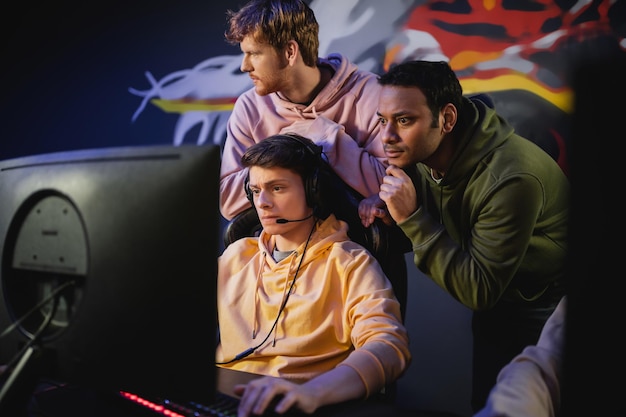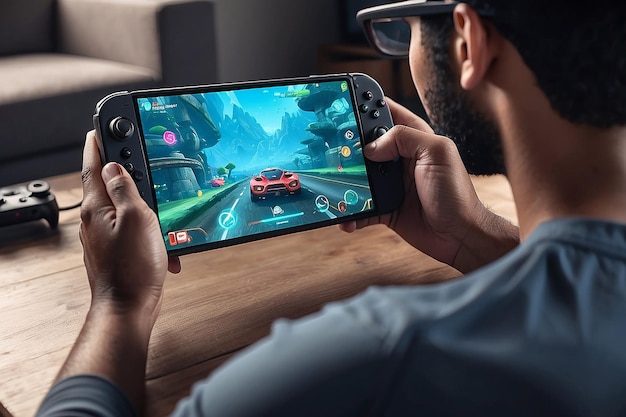
Empower Your Players to Become Creators
Imagine designing systems that let players build their own content, share it with others, and extend your game's lifespan by years. User-generated content transforms players into long-term community contributors.
Back to HomeWhat This Program Delivers
You'll gain the technical and design knowledge to build UGC systems that empower players while maintaining quality and safety. These are complex platforms, and you'll learn how to approach them thoughtfully.
System Design Capabilities
You'll understand how to architect UGC platforms from the ground up—creation tools that players can actually use, sharing systems that work smoothly, moderation workflows that scale, and technical infrastructure that handles user-created content reliably.
These aren't small features you're adding; they're entire ecosystems that need careful planning and implementation.
Strategic Thinking You'll Develop
Beyond the technical work, you'll develop strategic understanding of how UGC affects game longevity, community dynamics, and business models. You'll learn to balance creator freedom with quality control, navigate IP concerns, and design incentive systems thoughtfully.
This broader perspective helps you make better decisions throughout the development process.
This program is designed for game developers, platform designers, and technical planners who want to understand how successful UGC systems work. You'll finish with knowledge applicable to both indie projects and larger platform initiatives.
The Complexity You're Facing
Building UGC systems is substantially more complex than adding standard game features. You're essentially creating development tools for people with varying skill levels, implementing content distribution networks, designing moderation systems that scale, and thinking through countless edge cases.
When you look at successful UGC platforms like Roblox, Minecraft, or Steam Workshop, the depth of systems involved can feel overwhelming. How do you even begin designing something that complex?
The Design Challenge
Creating tools that are powerful enough for experienced creators but accessible enough for beginners requires deep understanding ofbility and progressive complexity. Getting this balance wrong frustrates everyone.
The Technical Complexity
Content validation, version control, dependency management, performance testing for user-created content, network synchronization—each system requires careful implementation and integration with your existing architecture.
The Policy Questions
IP protection, revenue sharing, content moderation at scale, handling inappropriate submissions, DMCA compliance—these policy decisions have long-term consequences and require thoughtful frameworks.
These challenges are substantial, but they're also solvable with proper understanding of how successful systems approach them. You don't need to reinvent solutions—you need to understand proven patterns and adapt them to your context.
How We Approach UGC System Design
We break down UGC systems into their component parts and teach you how each piece works, how they integrate, and what design decisions matter most for success.
Understanding Creation Tools
We examine what makes level editors and creation tools effective. You'll learn about interface design for creative tools, constraint systems that guide without limiting, real-time preview and testing, asset management, and progressive feature disclosure. You'll design creation tools yourself and analyze what works.
Through hands-on exercises, you'll build simplified versions of common UGC tools, which gives you practical understanding of the technical challenges involved.
Implementing Distribution Systems
You'll learn how platforms like Steam Workshop actually work—the technical infrastructure for uploading, versioning, downloading, and updating user content. We cover content validation pipelines, dependency resolution, compatibility checking, and performance verification.
You'll implement basic workshop-style systems to understand the architecture patterns that make content sharing reliable at scale.
Designing Moderation Workflows
Content moderation for UGC platforms requires both automated systems and human review processes. You'll learn to design reporting systems, implement automated filters, create review queues for moderators, handle appeals, and make policy decisions about acceptable content.
We examine real case studies of moderation failures and successes, helping you anticipate problems before they occur in your platform.
The curriculum is comprehensive: level editor design, mod support implementation, workshop integration, content moderation systems, IP protection frameworks, revenue sharing models, technical infrastructure, quality assurance processes, and community curation approaches.
We focus on practical implementation knowledge—not just theory, but actual technical approaches you can apply to real projects.
Your Development Journey
This program is structured around building increasingly complex UGC system components, so you develop both theoretical understanding and practical implementation skills.
Analyzing Existing Systems
We start by dissecting successful UGC platforms. You'll examine how different games approach creation tools, content sharing, and moderation. This analysis builds your understanding of what works and why, giving you mental models for your own design work.
Building Core Components
You'll implement fundamental UGC system pieces: basic level editors, content upload mechanisms, simple moderation queues. These projects teach you the technical patterns that scale to full platforms. Each component receives detailed code review and architectural feedback.
Integrating Complex Features
As your understanding deepens, you'll work on more sophisticated challenges: implementing Steam Workshop integration, designing revenue sharing systems, creating community curation tools. These exercises mirror what you'd build in production environments.
Planning Complete Platforms
Your final project involves designing a complete UGC platform architecture for a game concept. You'll make decisions about tools, infrastructure, moderation, policies, and business models. This comprehensive planning exercise brings together everything you've learned.
Technical Depth and Collaboration
This program is technically demanding. You'll write code, design systems, and solve complex integration problems. We work closely with you on implementation challenges, helping you understand not just what to build but how to build it effectively.
You'll collaborate with other students on some projects, which reflects how UGC systems are typically built in practice—they're too complex for individuals working alone. These collaborations teach you communication and coordination skills alongside technical knowledge.
Your Investment in UGC System Expertise
Complete UGC Systems Design Program
Technical training with hands-on implementation and architectural guidance
What's Included
- Level editor design and implementation
- Mod support architecture and integration
- Steam Workshop implementation techniques
- Content moderation system design
- IP protection frameworks and policies
- Revenue sharing models and implementation
- Technical infrastructure and scalability
- Quality assurance for user-generated content
- Community curation and featuring systems
- Hands-on implementation projects
- Complete platform architecture design
The Strategic Value
UGC systems represent significant strategic investments for games. When implemented well, they extend game lifespan dramatically, increase player engagement, build loyal communities, and create network effects that attract new players.
Understanding how to design these systems positions you for technical leadership roles in game development. Studios increasingly recognize that UGC capabilities can differentiate their products in crowded markets.
The skills you develop here apply across gaming and beyond—any platform dealing with user-generated content faces similar challenges around creation tools, distribution, moderation, and community management.
This program represents an investment in becoming the kind of developer who can architect complex, player-empowering systems that define the next generation of gaming experiences.
We're committed to providing deep technical education that prepares you for the actual challenges of building UGC platforms. This is advanced work, and we approach it with the seriousness it deserves.
How We Evaluate Your Progress
Your development is measured through implementation projects and design reviews that demonstrate your growing technical capabilities.
Technical Implementation Review
Each major component you build receives thorough code review and architectural assessment. We examine not just whether it works, but whether it's built in ways that would scale to production use.
This feedback helps you develop professional implementation habits and understand the difference between prototype code and production-ready systems.
System Design Evaluation
Your platform architecture projects are evaluated on completeness, technical soundness, scalability considerations, and policy thoughtfulness. We assess whether your designs account for the real challenges UGC platforms face.
These design reviews prepare you for technical planning roles where you'll make similar architectural decisions with real consequences.
Realistic Expectations About Learning
UGC system design is complex, specialized knowledge. You won't become an expert in a few weeks—that's not realistic. What you will gain is solid foundational understanding and practical experience implementing core components.
Progress markers you can expect:
- Early stages: Understanding how UGC platforms work architecturally and building simple components
- Middle stages: Implementing more sophisticated features and understanding integration challenges
- By completion: Capable of designing complete UGC platforms and implementing core systems
Mastery comes with professional experience building and maintaining these systems over time. This program gives you the knowledge to start that journey with confidence and understanding.
Student Outcomes
Since September 2024, students have completed over 80 UGC system components and designed 30+ complete platform architectures. About 85% finish the full program—the technical demands filter for people genuinely committed to this specialization.
Making Your Decision
This is a significant investment in specialized knowledge. We want you to approach it thoughtfully and feel confident about your choice.
Consultation Before Enrollment
Before you commit, let's discuss your background, your project needs, and whether this program matches your goals. UGC system design is specialized work—it's important that you're pursuing it for the right reasons and have realistic expectations.
This conversation helps both of us determine if this program is appropriate for your situation. We'll be honest about whether we think it's the right fit.
Our Teaching Commitment
We're committed to providing technically rigorous education that reflects how UGC systems are actually built. When you struggle with complex concepts—which you will—we'll work with you to find explanations and approaches that help it make sense.
Your technical development is our priority. We're invested in helping you build genuine capability, not just completing the program.
If Expectations Don't Match
If you discover early on that the technical level or focus isn't what you expected, let's discuss it openly. We'd rather address mismatched expectations directly than have you continue feeling uncertain about your investment.
We're focused on providing real value through technical education, not just filling enrollment slots.
Students who complete this program typically describe it as challenging but rewarding. The technical depth requires sustained effort, but that effort translates into capabilities that are genuinely valuable in game development.
Ready to Design UGC Systems?
If you're serious about learning UGC system design, here's how to proceed.
Make Contact
Email us at info@morvishland.com describing your technical background, why you're interested in UGC systems, and what you hope to accomplish. We typically respond within one business day.
Technical Discussion
We'll schedule a conversation to assess your background and discuss program content in detail. This helps us understand if your experience level matches the program requirements and lets you ask technical questions about the curriculum.
Evaluate and Decide
After understanding what the program involves, decide if it aligns with your goals and whether you're ready for the technical demands. If you choose to enroll, we'll handle registration and provide preparatory materials.
Begin Technical Training
You'll receive session schedules, project specifications, and technical resources before starting. Then you'll begin the intensive process of learning to design and build UGC systems.
Prerequisites and Expectations
This program assumes solid programming experience and familiarity with game development concepts. You should be comfortable reading technical documentation and learning new tools independently.
- Technical background: Programming experience and basic understanding of game architecture
- Time commitment: Significant—projects require substantial work outside sessions
- Learning style: Self-directed with guidance—not hand-holding through every step
- Group format: Small cohorts for technical discussions and collaborative projects
UGC Systems Define Modern Gaming
The games that dominate player attention and engagement increasingly rely on user-generated content. Minecraft, Roblox, Fortnite Creative—these platforms succeed because they empower players to create.
If you want to build the next generation of player-empowering platforms, you need deep understanding of how these systems work. This program provides that foundation through rigorous technical education and hands-on implementation.
Start Your UGC JourneyLocated in Suginami, Tokyo • Contact: +81 3-5306-6638 • info@morvishland.com
Explore Our Other Programs
Interested in different aspects of gaming? Check out our other training programs.

Game Modding Fundamentals
Learn to create and distribute game modifications across popular platforms. Master texture editing, model importing, and gameplay modification through hands-on projects.

Community Management for Gaming
Build and nurture thriving gaming communities across platforms. Learn Discord management, moderation practices, and engagement tactics that keep players connected.